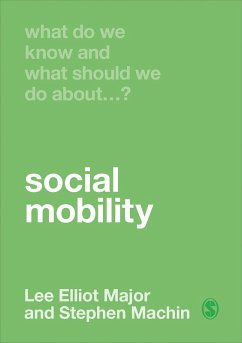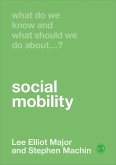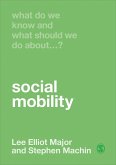Featured in the Financial Times Best Books of the Year 2020
The evidence is rigorously marshalled and the...solutions equally clearly illuminated. A definitive study. - Martin Wolf, Chief Economics Commentator, The Financial Times
In this vital new book, Britain's first Professor of Social Mobility Lee Elliot Major and Stephen Machin, reveal the causes of the UK's low social mobility, explain why it's getting worse, and outline how we reverse this worrying trend, before it's too late.
It covers the history of social mobility in the UK, explores international comparisons, analyses the recent 'dark age' of declining absolute mobility, and investigates issues such as how family traits affect inter-generational mobility. The authors then outline what it is we should do about this pressing issue. Calling for a fundamental shift in debates about social mobility and arguing that only by establishing general principles of fairness in society can we agree the major policy reforms that can make Britain a more mobile and just society for all.
The evidence is rigorously marshalled and the...solutions equally clearly illuminated. A definitive study. - Martin Wolf, Chief Economics Commentator, The Financial Times
In this vital new book, Britain's first Professor of Social Mobility Lee Elliot Major and Stephen Machin, reveal the causes of the UK's low social mobility, explain why it's getting worse, and outline how we reverse this worrying trend, before it's too late.
It covers the history of social mobility in the UK, explores international comparisons, analyses the recent 'dark age' of declining absolute mobility, and investigates issues such as how family traits affect inter-generational mobility. The authors then outline what it is we should do about this pressing issue. Calling for a fundamental shift in debates about social mobility and arguing that only by establishing general principles of fairness in society can we agree the major policy reforms that can make Britain a more mobile and just society for all.
Dieser Download kann aus rechtlichen Gründen nur mit Rechnungsadresse in A, D ausgeliefert werden.
The authors are two well-known British experts on the economics of social mobility. In this short, but comprehensive, survey, they illuminate the relatively poor UK record on mobility and what might be done to improve it. The evidence is rigorously marshalled and the complexities (and political difficulty) of solutions equally clearly illuminated. A definitive study. Martin Wolf









